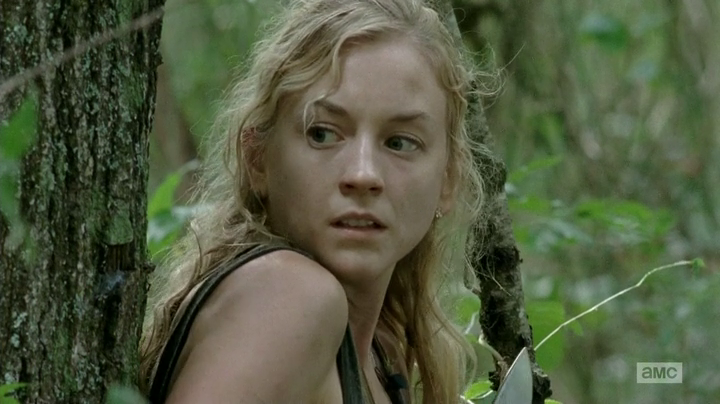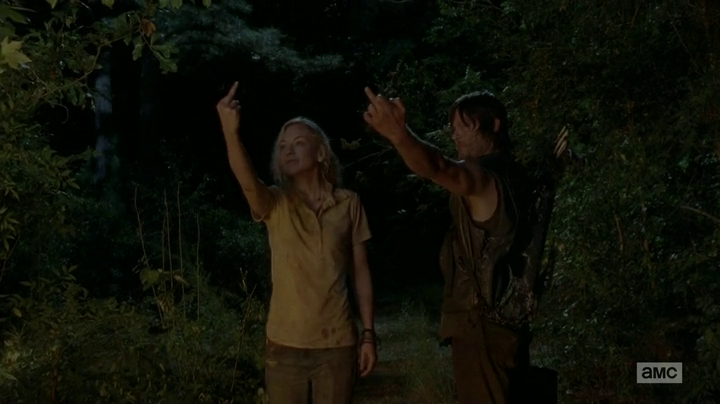The Walking Dead Season 4 Episode 12 Review: Still

We've had some low-key, intimate episodes of The Walking Dead before, but this week's instalment, Still, pushed the envelope of what the horror show can do even further. Featuring just Beth (Emily Kinney) and Daryl (Norman Reedus), writer Angela King used the 45 minutes to provide a touching and insightful examination of its two characters that made it one of the drama's strongest episodes to date.
Beth and Daryl continue to hide out in the woods, their back to basics lives involving using a car's rear view mirror to light a fire, and Daryl in some pretty disgusting hunting, skinning and chomping on snake action. But after all the horrors she's been through, witnessing her dad be decapitated by the governor right in front of her, Beth is imbued with a new blazon spirit, and demands she of all things wants to drink alcohol for the first time.
'Welcome to the dogtrot'
An episode based around a booze cruise doesn't immediately stand out as either gripping drama or a chance to explore the characters, but as the two uncover a once luxury gulf resort, and later an always miserable squalor in the woods, the episode presents an engaging look at how we are both shaped by, and can overcome our upbringings.
Whilst we've mainly seen drab surroundings such as the prison or towns, the golf resort here serves as a reminder of the leisure and privilege that once existed for the upper echelons of society. Now it's the scene of a mass grave of bodies both shot in the head and hanged, with the sign 'Rich Bitch' left on one of the supposed former club members.
Wealth and status might have mattered back then, but not anymore. In a great scene during her quest for a first drink, Beth finds a bottle of wine, but immediately has to smash it in order to glass an approaching walker. Their current existence doesn't permit luxuries, only tools for survival.
"I'm just use to things being ugly."
It's no surprise to find Daryl isn't a fan of the Peach Schnapps Beth suggests, and it's when he takes her to have a real drink at the ramshackle house in the woods, that the two's pent up emotions are finally let out.

The apocalypse served as a great leveller, smashing class, race and social divides to bring people in to contact with one another from all walks of life. Here it's Daryl the redneck who is paired with Beth the sweet and innocent farm girl. Revealing in a game of 'Never have I ever' that he's not only never been on holiday, but never been out of the state, we are given a glimpse of how his impoverished previous life perfectly set him up to survive after Armageddon. As he admits to Beth, "I'm just use to things being ugly".
The Moonshine further frees him up to let out his anger at frustrations at what he sees as Beth's childishness and naiveté about their different social upbringings, with the terrific climatic scene allowing the two actors to shine as their characters finally let out their feelings. Daryl berates Beth for wanting to get drunk "like a dumb college girl," saying that life is tough and not a game, but she immediately demands respect, saying, "I know you look at me and you just see another dead girl," adding, "You don't get to treat me like crap just because you're afraid".
"You've got to say who you are, not who you were."
The two are both brought to tears as the pain of Hershel's death is realised, with the guilt and grief explaining the reasons for Beth's rebellious attitude and Daryl's silent surliness. Telling Daryl that it's how you act in the present that's important, her line, "You've got to say who you are, not who you were," perfectly encapsulates the message of the episode.
You've got to say who you are, not who you were.
This was an episode almost perfect in its construction and execution, writer Angela King using sparse dialogue to build up tension before that explosive confrontation at the end. It's what the show's writers should be doing, fleshing out existing characters rather than just introducing new ones.
And how refreshing to have the big dramatic moments of the episode not based around zombie horror action set-ups, but imitate drama with firecracker dialogue delivered from two fantastic performers. The symbolism might have been bloated as they burned down the hillbilly house with dollar bills, but at least in this episode The Walking Dead explored a theme beyond just how to survive.
© Copyright IBTimes 2025. All rights reserved.




















